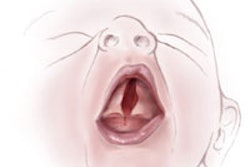A new federal initiative to accelerate research on pediatric diseases and conditions will fund a study that seeks to learn more about the causes of cleft lip and palate.
The study is being led by researchers at the University of Pittsburgh (Pitt) School of Dental Medicine and Graduate School of Public Health. The Pitt researchers, along with other researchers from U.S. universities, will examine the genomes of 1,300 people, including 430 children affected with clefts and their parents.
"This sequencing will provide a wealth of data that will be made available to scientists everywhere, providing the basis for years of research into causes, prevention, and treatment of cleft lip and palate," stated Mary Marazita, PhD, the project's director and principal investigator, in a press release. "We are thrilled that our project was among the first funded and excited for the crucial information this effort will reveal."
Funding is from the new Gabriella Miller Kids First Research Act, the National Institutes of Health (NIH), and Office of the NIH Director. The act is named for a girl who died of brain cancer at age 10, and it amends the tax code to allow the NIH to direct the funding of $12 million in pediatric research projects each year for the next 10 years.



















